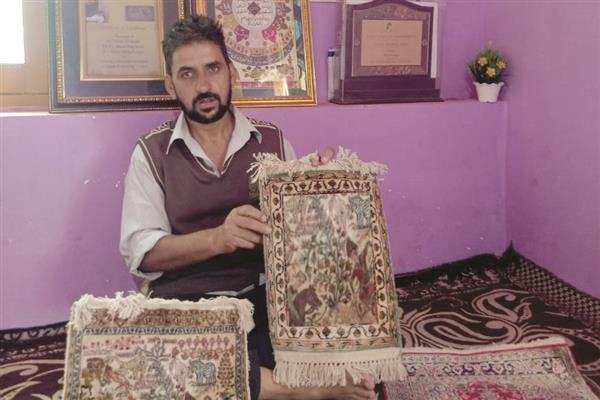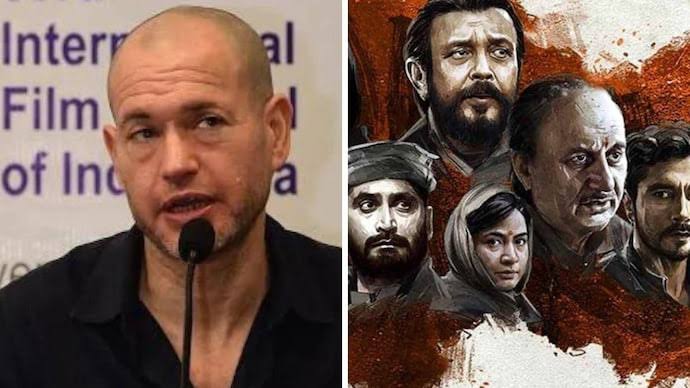Kulgam, Aug 17: Ghulam Ali Sheikh was a young boy when he learned the art of weaving carpets from his father. He used to keenly watch his father and took the mantle after a few years.
Ali, now 50, a resident of Shahoo Sachan village in the east of Kulgam district has earned fame with his unique pictorial carpets. The artist weaves the masterpiece by using several coloured threads that easily catch the human eye. He weaves the carpets on a loom composed of two horizontal parallel wooden beams which make this work special. The hand-knotted carpets are quite different from that of machine ones.
Recently he weaved carpet knitting 54 knots in an inch. “People usually weave 18 knots in an inch, if they go for 25 they say we will lose eyesight, I knotted 54,” Ali told Rising Kashmir.
“In that carpet embossed most of the sea animals and also placed a portrait of the sea on it,” he said. For this work he got a state award later. And he went further with 72 knots in an inch that bagged him the national award.
The journey of Ali Sheikh
He began his journey by receiving training from his father. He also went to a government centre as a learner and later shifted to a private centre to learn the subtleties of the art.
His success story began. back in the 1990s when he tried his hand at making National award winner carpets. Belonging to an average middle-class family, Ali learned the skill and with it, his name too started echoing in the vicinity. Ali received his very first award in 2012 when he was among the position holders in J&K among craft artisans. The then chief minister Omar Abdullah handed him the award with a cash prize of 50 thousand.
In 2015, Ali was part of a famous festival in Kerala. SargaalyaIringal International Crafts Festival at Iringal, where he started weaving the double-sided carpet.
At the festival, Ali made a double-sided loom carpet which had a portrait of Allama Iqbal on one side and flowers on another side. He was awarded the first prize for weaving a double-sided carpet, which was easy to carry in a bag, he said.
When asked how he learned the art of pictorial designs, he said “Earlier I used to make graphs by myself and then paste photos on it to make portraits on carpets. However, later I used to buy graphs from booksellers and draw pictures on it by this way the imbibed process would be weaved on carpets.”
Pictorial designs and awards thereof
The artisan has been engraving different portraits of humans, animals and other creatures on the carpets. He first weaved a portrait of Ayatollah Khamenei of Iran on the carpet. “After the normal carpet weaving didn’t get much attention, I thought let us do something different and I first weaved/designed the picture of Khamenei sahab,” he said.
Ali also designed portraits of Ghalib, Iqbal, Modi, APJ Abdul Kalam, Mahatma Gandhi, Lakshami Rani, Ayatul Kursi, Char Qul, Kaaba, and Masjid al Nabawi. In the year 2017, Ali’s pictorial design on a double-sided carpet earned him a national award. Back then he had weaved a 1000 rupees note, Prime Minister Narendra Modi, APJ Abdul Kalam with a missile on a double-sided carpet. For this unique work, he was awarded by the central government, with a cash prize of one lakh rupees.
Imparting the skill among people
Ali has successfully imparted the skill to his wife, who helps him in weaving the carpets now. His brother-in-law too has learned the skill from him and both his disciples have been awarded state prizes. “My wife has received a state merit award in 2012, and my brother-in-law has been awarded second position in 2019,” he added.
He has been teaching the women folk in the locality and at government established centre at Hablish a village in Kulgam district. “Where ever I go, I impart the skill among people who show interest, I haven’t counted how many I taught but there are many of them,” Ali said.
Ongoing work
Currently, Ali is working on a piece of double-sided carpet for which he has been working for three years. “This piece of carpet is three angled work, it has Ayatul Kursi engraved in the moon (background), Masjid Al Nabawi and on the other side, it has Kaaba and Baitul- Muqaddas (Masjid Al Aqsa).”
Need to preserve the dying art
The past few years have been very disappointing for him. “The art is dying now,” Ali said. The machine-made carpets, which cost less, are being preferred by the general masses. The hand-knotted carpets usually cost more and it has hit the weavers badly. But, Ali still prefers and is determined to weave using hand-knotted thread to settle the score in parallel to mechanized carpets.








